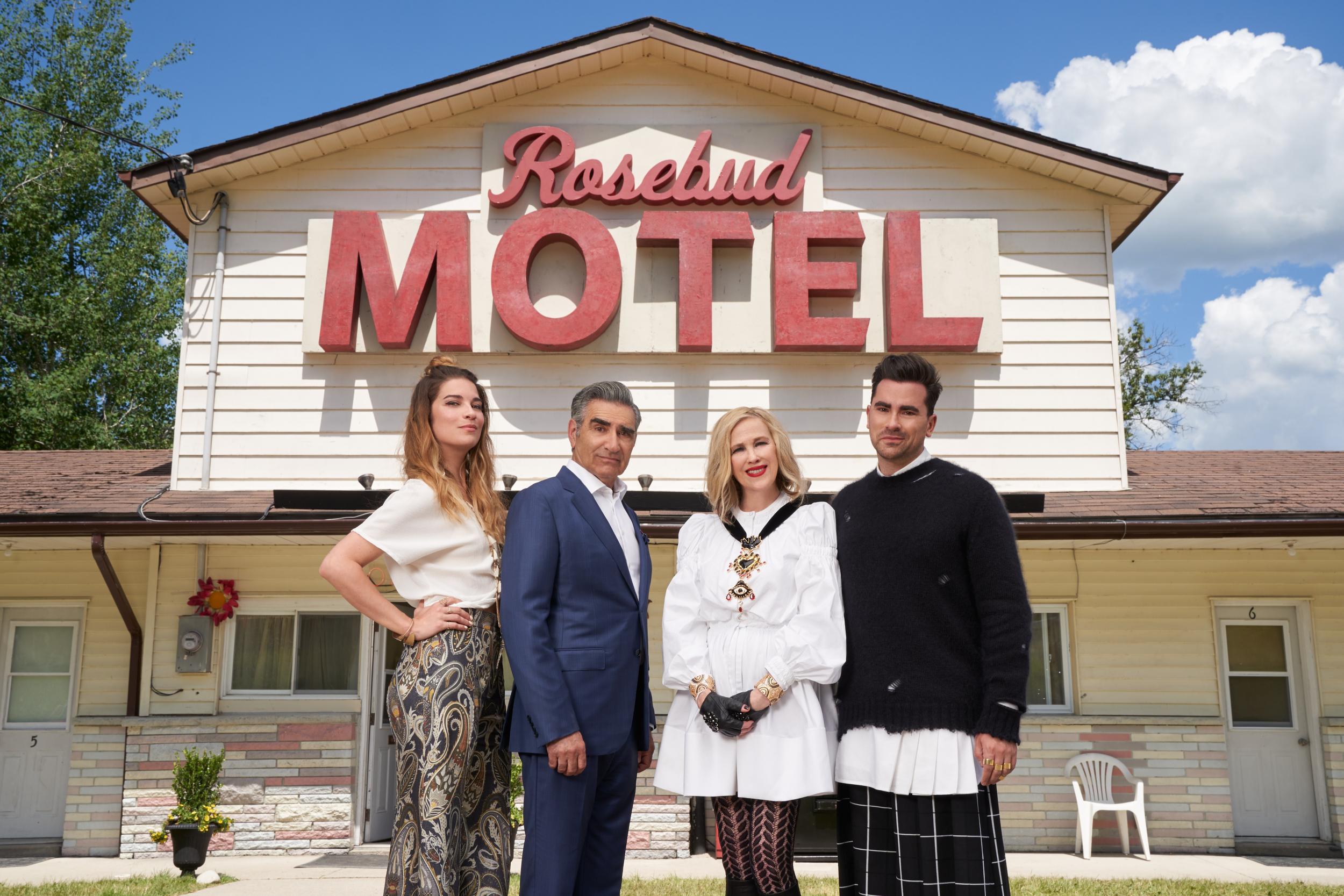Queer folks from small towns know exactly why Schitt’s Creek won big at the Emmy’s
Eugene and Daniel Levy’s ‘backwards’ small town is an unexpected utopia, free from homophobia

The results are in from the 72nd Primetime Emmy Awards and beloved queer Canadian sitcom Schitt's Creek has swept all seven comedy awards, becoming the first comedy series to do so and setting a record for the most wins in a single season for a comedy.
The Emmys toast, which was held virtually on Sunday night due to the coronavirus pandemic, celebrated the most recent season of primetime TV. Succession, Last Week Tonight, and Zendaya won, among others. But, throughout the night, Schitt's Creek definitely stole the spotlight with wins for writing, directing, casting, and contemporary costumes, as well as acting awards for Eugene Levy, Annie Murphy, Daniel Levy, and the inimitable Catherine O'Hare.
While some have balked at the series' wins and raised questions about whether they were deserved, for queer viewers like me, it's easy to see why this hilarious show has received critical acclaim.
Schitt's Creek, which concluded its six-season run in early April, tells the story of a rich family who loses their wealth, retreating to a small, backwater town — or at least, that's what the series appears to be at the start. What stood out to me as it developed, however, was the show’s depiction of a pansexual man finding love and acceptance for the first time in his life, and how that small town thrives as a place free of homophobia.
For me, Schitt's Creek’s “backwards” town was a realistic utopia.
Growing up, I lived in a small town in rural Colorado. I knew exactly four queer people: my uncle who lived in San Francisco, one kid at school that everyone made fun of, and the couple my best friend's dad described as "those dykes on bikes."
"That's so gay" was one of the most common responses when someone expressed sincere interest in something. When my parents would fight, they'd sling homophobic epithets at one another: my mother shaming my father for showing sensitivity or having close male friendships, my father bringing up the actual sexuality of my uncle in response.
I learned to hate queerness so much as a child. The churches I attended with my friends were very clear in their message that homosexuality was truly the worst sin. You could be forgiven for many things, including beating and cheating on your wife, but being in love with someone who shares your gender? Oh, no. Jesus didn't save seats for queers.
The first time I watched Schitt's Creek, I was skeptical, but my younger sister begged me to, saying how much it reminded her of our hometown woes. What she didn't tell me was that one of the central characters, David Rose (Daniel Levy), was pansexual and open about it in that small town. Watching David navigate Schitt’s Creek, build his first real friendship not based on his wealth, grow closer to his family, and finally find the love he'd been waiting for helped me heal in ways I didn’t anticipate.
Schitt's Creek helped me believe I had a right to be accepted as a queer kid in a small town. It made me believe that not everyone from a rural place is filled with hatred and bigotry toward LGBTQ+ folks. Perhaps, most importantly, it made me feel a little safer in the world because it suggests the world can be free of homophobia. Life often imitates art, and Schitt's Creek provides a blueprint for acceptance and understanding through our differences.
David offered me a lifeline as a trans, nonbinary, bisexual person. The way I both deeply identified with him and felt affection toward his character made me accept my “nonbinaryness” and my transness. I couldn't shake the connection I felt — and still feel — when I watch him onscreen. David Rose, that gorgeously written character, is a part of me.
This connection and healing is an unforeseen and welcome consequence of my viewing the award-winning series. I used to spit on the name of my hometown, plagued by memories of harassment and hatred. Today, I see all the queer people I went to school with and celebrate how bravely they've found themselves since. I think about how we could share our stories with each other and the world.
Schitt's Creek recognizes that queer people are everywhere and argues that we deserve to not only be safe, but to be loved, respected, and cultivated wherever we are. If that's not Emmy-worthy, I don't know what is.
Join our commenting forum
Join thought-provoking conversations, follow other Independent readers and see their replies
Comments